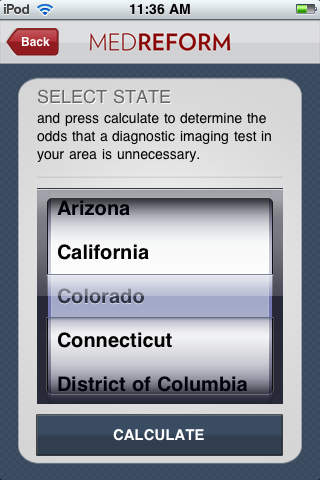
MedReform app for iPhone and iPad
Developer: Geographic Variation and Waste in Health Services, Inc.
First release : 27 Sep 2010
App size: 1.59 Mb
Efforts to address cost and quality in the 2010 health reform legislation essentially ignored the most important "player" in the health care system, the patient. Everyone agrees that there is significant waste in the U.S. health care system. What was missed is the realization that the informed patient has the greatest capacity to impact cost and quality in health care (and vastly reduce waste), and can do it more quickly than any other approach.
There are 2 requirements for consumers to address waste in the health care system. First, consumers must realize that there is significant variation in the use of tests, medicines, and procedures across the country, and that this significant variation defines most of the waste in the system. Second, the consumer must realize that unnecessary procedures, tests, or medications can be harmful and should be avoided. In a nutshell, variation is wasteful and harmful.
Most patients and providers have no idea how much variation there is in the use of medical tests, medications and procedures. This purpose of this app is to supply data on the variation seen in the use of common medical tests, procedures and medications, thus empowering consumers, family members, and providers to understand the odds that a test, procedure or medication may be unnecessary.
What does this app do?
This first installment of the app tells you the odds that a diagnostic imaging test in your area is unnecessary, based on how the per capita rate of utilization in your area compares to that of the "best care" in the U.S. With this information, patients, family members, and providers can become aware of the significant variation seen across the U.S. in the use of non-invasive diagnostic imaging (i.e. X-Ray, CT scan, MRI, ultrasound, etc) and consumers can be empowered to ask: Do I really need this test?
Why is this important?
1. Depending on where you live, the odds of getting an unnecessary diagnostic imaging test can be significant.
2. About 29,000 cancer cases per year are likely due to the radiation of previous CT scans (reference below).
3. Unnecessary tests waste lots of money.
4. Sometime unnecessary tests have "false positive" results, causing a cascade of more unnecessary tests and procedures.
In general, more health care is not necessarily better health care. In fact, more health care is often worse health care...and sometimes its much worse.
Future updates will address other tests, medications and procedures that have significant variation across the country. Large geographic variation in the use of health resources almost always highlights waste in the system.
Massive Disclaimer: Obviously this app knows nothing about you personally, your medical conditions, your risk factors, your family history, lifestyle, diet, or anything else about you. Thus, the purpose of this app is not to tell you what to do in a specific situation. Its purpose is to help people learn more about the possibility that a medical test, medicine, or procedure may be unnecessary and that, in some cases, getting something that is unnecessary can be bad for your health, either in the short term or in the long term.
Designed and developed by WillowTree App.



